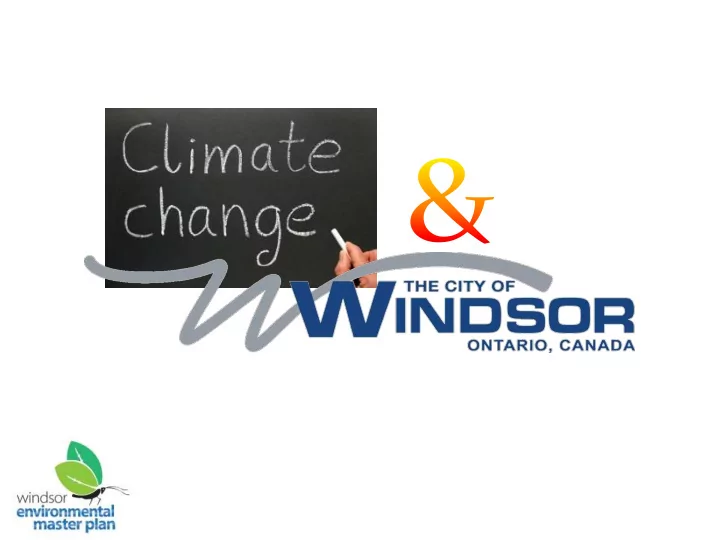

What is Climate Change? Climate change refers to a long-term shift in weather conditions. It is measured by changes in climate indicators like temperature, precipitation and wind
Is Climate Change Natural? The climate has changed many times before, from ice ages where glaciers sat on top of what is now Windsor to the times of the dinosaurs, where the Earth was so warm that ice did not exist at the poles.
Most of the climate changes in Earth’s history have been naturally caused – driven by the sun or events like asteroids. However, in the last 200 years, that responsibility has changed and people are now the primary cause.
Climate Change Today
http://www.climate-lab- book.ac.uk/files/2016/05/spiral_optimized.gif
The Planet is Warming; So What? Extra heat in the Earth system drastically affects the climate system and the weather we experience. We can tie this extra heat to: Stronger Storms Flooding Heat Waves And much more Melting Sea Ice Disease Vectors
What Can We Do? Climate change actions are typically separated into two broad categories: adaptation and mitigation. The City of Windsor is working on both mitigation and adaptation. Results of the ongoing drought in California, which scientists say is more likely to occur in a warming climate
Mitigation Mitigation – reducing climate change – involves reducing greenhouse gases into the atmosphere. Electric cars run off electricity, which can be Solar panels produce clean energy from the sun produced from clean sources, rather than gas
Adaptation Adaptation – developing ways to protect people and places from a changing climate A raised house that will not flood Towns in Germany can rapidly set up walls that prevent homes from flooding
Controlling our Emissions: Climate Mitigation Where does our Greenhouse Gas Emissions come from? The majority of Windsor’s emissions come from buildings
Mitigation Actions To reduce emissions, the City has developed initiatives such as an Anti-Idling Bylaw to reduce emissions from transportation
Idling Gets You Nowhere Residents of Windsor spent almost $400 million on gasoline and diesel in 2014, more than on any other type of fuel. Because you get zero mpg gas mileage when idling, it is the biggest waste of gas there is. If every vehicle in Windsor avoided idling for 3 minutes a day, it would save $15,480 per day (that’s over 5.7 million dollars each year!)
Community Energy Plan To better manage how energy is used throughout Windsor, the City is working on a Community Energy Plan and Climate Change Action (Mitigation) Plan How Much Energy Does How Do Windsor Homes Stack Up? Your Home Use? Danish Average Average Household Ontario Average Energy Use (GJ) Windsor Average 0 50 100 150 GJ/Household Low High Windsor’s homes use on average 35% more energy than the Ontario average and more than twice the Danish average Windsor is developing a Community Energy Plan with the goal to create jobs, attract and retain business and keep more money in our local economy while reducing greenhouse gas emissions and energy use. Find out more about the plan and public meetings: www.windsorenvironmentalmasterplan.ca
How does your school neighbourhood compare? As a community, Windsor spent $841 million on energy (electricity, gasoline, diesel and natural gas) in 2014, or nearly $4000 per person
Mitigation Actions Buildings are the largest consumer of energy in Windsor, and the largest source of greenhouse gas emissions. The Community Energy Plan looks for ways to improve the energy efficiency of buildings, leading to emissions reductions
Mitigation Actions Transportation is also a large source of emissions. Electric vehicle, taking public transit, using a more fuel-efficient vehicle, or walking or biking instead of driving are all ways that greenhouse gas emissions can be reduced
Coordinated Action Windsor is participating in national and international programs to report on emissions and coordinate action. Progress is being made!
Why Adapt? Even with mitigation efforts we will have to adapt. Some of Windsor’s risks include: Low/Warm Lake Levels Air Quality Concerns Algae Blooms Lyme Disease Flooding
Preparing for the Storm: Climate Adaptation The City of Windsor has a Climate Change Adaptation Plan
Adaptation Actions Windsor is already acting!
What can the You do? Home flooding has been the most consistent disaster cause in Windsor history Programs like the Downspout Disconnect program and sewer investments help reduce the chance of basement flooding.
The Long View Understanding how the climate will change is necessary to knowing how to deal with that change. Flooding is a major risk to Windsor, and the systems put in place today to drain floodwater will be in the ground for 100 years. Windsor has partnered with regional municipalities and the Essex Region Conservation Authority to see how flood-causing storms will change this century so that we can start preparing for them.
Leaves and Roots Trees are one of a City’s best options to help flight climate change. Not only do they absorb carbon dioxide to grow, but the shade they provide helps keep cities cool, and their roots can help drain water into soil more quickly, reducing the risk of flooding
Climate change is happening, humans are causing it, and I think this is perhaps the most serious environmental issue facing us. - Bill Nye, The Science Guy The City of Windsor understands this, and is committed to all reasonable efforts to mitigate and adapt to our changing climate, and hopes that you will too.
Recommend
More recommend